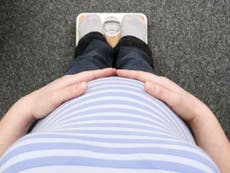Britons who drink two or more cups of tea have lower death risk, study suggests
Researchers said it did not matter if the person also drank coffee, added milk or sugar to their tea or what their preferred tea temperature was
Your support helps us to tell the story
From reproductive rights to climate change to Big Tech, The Independent is on the ground when the story is developing. Whether it's investigating the financials of Elon Musk's pro-Trump PAC or producing our latest documentary, 'The A Word', which shines a light on the American women fighting for reproductive rights, we know how important it is to parse out the facts from the messaging.
At such a critical moment in US history, we need reporters on the ground. Your donation allows us to keep sending journalists to speak to both sides of the story.
The Independent is trusted by Americans across the entire political spectrum. And unlike many other quality news outlets, we choose not to lock Americans out of our reporting and analysis with paywalls. We believe quality journalism should be available to everyone, paid for by those who can afford it.
Your support makes all the difference.Britons who drink black tea tend to have a lower risk of mortality compared to those who don’t, a new observational study has suggested.
The study, which was funded by the US National Cancer Institute, was conducted with a questionnaire answered by half a million people in the UK between 2006 to 2010. It was then followed up over a 14-year period.
Researchers said, when compared with those who do not drink the beverage, people who consumed two or more cups of English Breakfast or Earl Grey tea each day had between a 9 and 13 per cent lower risk of death.
Higher tea intake was also associated with a lower risk of cardiovascular diseases, the study found. There was was no clear trend for cancer deaths.
The findings, published in the Annals of Internal Medicine on Monday 29 August, were not impacted by factors such as whether the person added milk or sugar to their cuppa, or their preferred tea temperature.
They were also not affected by the rate at which people metabolise caffeine.
Fernando Rodríguez Artalejo, professor of preventive medicine and public health at the Autonomous University of Madrid, said: “This article shows that regular consumption of black tea (the most widely consumed tea in Europe) is associated with a modest reduction in total and, especially, cardiovascular disease mortality over 10 years in a middle-aged, mostly white, adult general population.”
He said the study does not definitively establish that tea is the cause of the lower mortality of tea drinkers, because it cannot exclude that this is down to other health factors associated with tea consumption.
Experts have also warned that a study like this, based on observing people’s habits and health, can’t prove cause and effect.
“Observational studies like this always raise the question: Is there something else about tea drinkers that makes them healthier?” said Marion Nestle, a professor of food studies at New York University. “I like tea. It’s great to drink. But a cautious interpretation seems like a good idea.”
Another question which remains unanswered is whether people who do not drink tea should start doing so to improve their health.
However, Maki Inoue-Choi, who led the study, said there’s not enough evidence to advise changing tea habits.
“If you drink one cup a day already, I think that is good,” she said. “And please enjoy your cup of tea.”
Additional reporting by Press Association and Associated Press.



